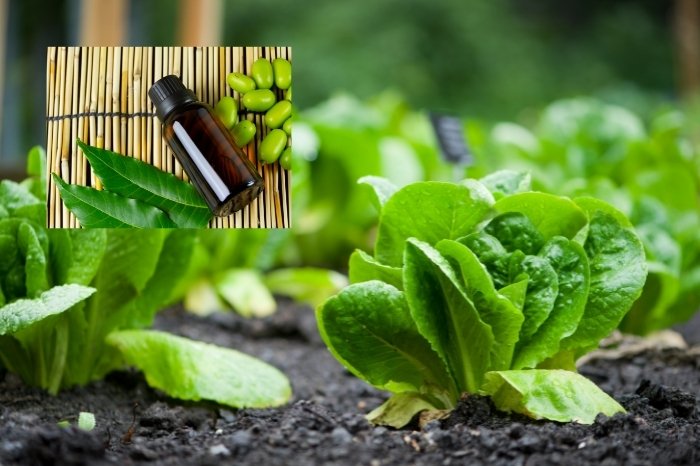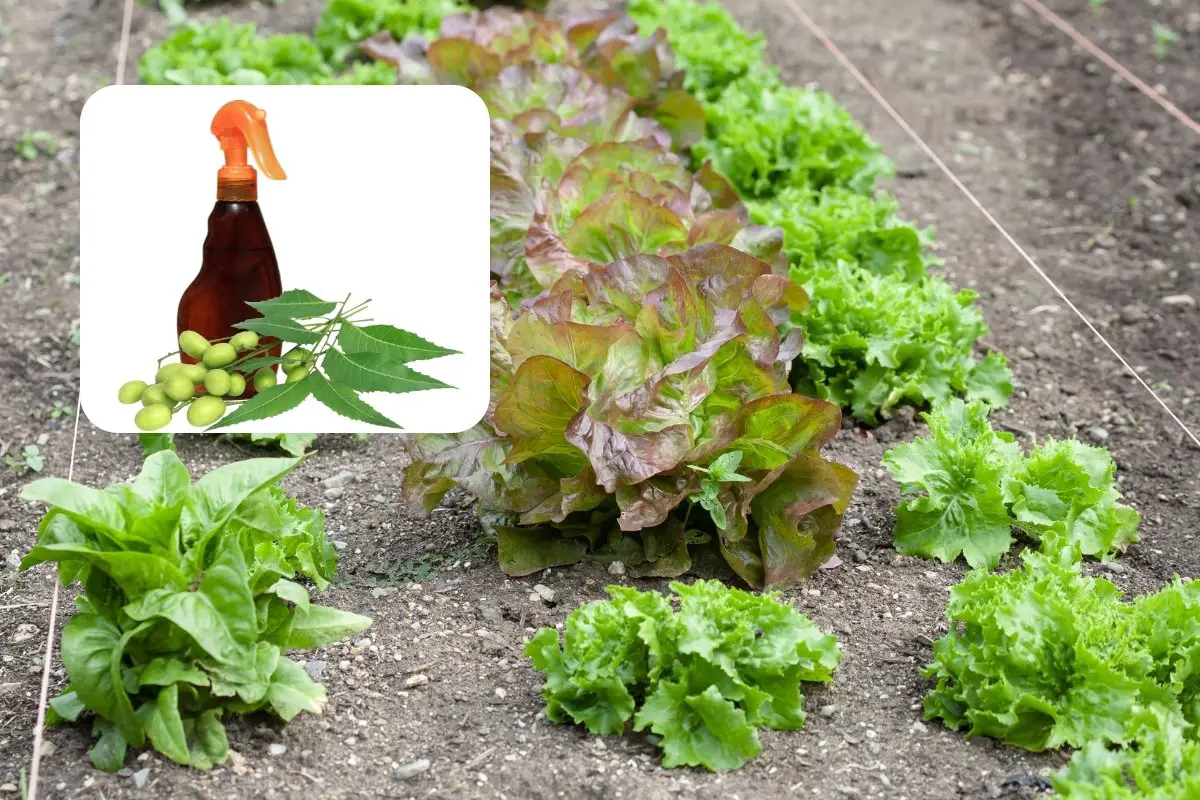Last Updated on July 18, 2022 by Cristina
Is it possible to use neem oil on lettuce as an organic pesticide to keep the pests away in a much more friendly way?
Neem oil is an important part of your gardening journey that you ought to keep nearby. It is a pesticide with many benefits and also a natural insecticide. The neem oil is usually extracted from the seeds of a tree in the neem family, that is Azadirachta indica.
It is very similar to other types of oils such as sunflower, cottonseed, soybean, sesame seed, and corn. Neem oil has a very high concentration of azadirachtin, a compound that has powerful insecticidal properties. Neem oil is used by many farmers to control pests in their crops and also as a natural pesticide to prevent the growth of insects in plants.
Benefits Of Using Neem Oil On Lettuce
- Neem Oil is Very Effective Against Many Types of Insects and Pests. It has been tested for its insecticidal properties and it has proven to be an efficient and safe alternative to synthetic pesticides.
- Neem Oil is a Natural Pesticide That is Derived From the Neem Tree. It is used as an organic pesticide and has shown to be effective against various insects and pests. It is especially effective against aphids, leafhoppers, thrips, whiteflies, and other small insects. It is also a safe natural pesticide.
- Neem Oil is Used for Gardening, Organic Farming and Greenhouses. It is used to control pests in the greenhouse or vegetable garden. It can be used in your house if you want to control cockroaches, ants and other insects. It can also be used in your car or boat as a bug spray.

Click Here to Get info About:
What Makes Neem Oil – Ingredients
Neem oil is usually extracted from the seeds of the neem tree. The neem tree is native to India. It can grow up to 60 feet tall and has white flowers that bloom between April and July. The neem tree contains an oil known as Azadirachtin.
Azadirachtin is the main active ingredient in neem oil. It is a non-toxic, naturally occurring substance that has insecticidal properties. It works by disrupting the nervous system of insects and preventing them from feeding. It is also a natural insecticide that can control pests such as aphids, mites, leafhoppers, mealybugs, and cutworms.
It is not recommended to use neem oil on humans because it can cause skin irritation. You can use it for other plants though. You can apply it to your garden plants and your houseplants.
How To Use Neem Oil On Lettuce
Neem oil can be used in different ways. You can spray it on your plants or you can make it into a homemade insecticide. You can use neem oil as a natural pesticide to keep pests away in a much more friendly way. You can use it in your home, office, or garden. Neem oil can be purchased at your local health food store.
Southern Ag 08722 Triple Action Neem Oil Fungicide Insecticide Miticide, Brown
Make A Neem Oil Pest Spray
Ingredients
- 2 cups of water
- 1 cup of neem oil
Instructions
- Add the neem oil to a container and add the water.
- Mix the two together well and then add the solution to your plants.
You can add this to your garden plants and houseplants. The neem oil should be sprayed on the leaves and stems of your plants. This will help protect your plants from bugs, ants, and other insects.
Use Neem Oil As A Natural Pesticide
Ingredients
- 1 cup of neem oil
- 1 cup of water
- 1/4 cup of vinegar
Instructions
- Place the neem oil in a glass container.
- Add the water and then add the vinegar.
- Mix all three together.
- Shake well and then apply to your plants.
This will also help keep pests away in your home or garden.
Keep Bugs Away In Your Home – Neem Oil On Lettuce
Ingredients
- 1 cup of neem oil
- 1/4 cup of vinegar
- 1/4 cup of water
- 1/4 cup of soap
Instructions
- Combine the neem oil, vinegar, water, and soap together in a glass container.
- Mix well and then pour into a spray bottle.
This will help keep bugs away in your home and yard.
Make Stronger Neem Oil Insecticide
Ingredients
- 1 cup of neem oil
- 1/4 cup of vinegar
- 1/4 cup of water
- 1/2 cup of soap
Instructions
- Combine the neem oil, vinegar, water, and soap together in a glass container.
- Mix well and then pour into a spray bottle.
This will help keep bugs away in your home and yard.
Final Words – Neem Oil On Lettuce
Using neem oil on lettuce is critical to ensure you grow your plants organically without the use of commercial pesticides.
FAQ’s
Is neem oil safe for lettuce?
Neem is a highly effective pesticide and it’s very important to ensure that you are applying it correctly and in the correct manner. When used properly, it’s safe to use on all lettuces. It’s important to remember though that it’s not a ‘cure-all’ and should be applied at the right time and in the right way.
Is neem oil safe to spray on vegetables?
Yes! Neem oil is a natural, non-toxic, pesticide that can be sprayed directly on any part of the plant. Why would I need neem oil? The primary function of neem oil is as a fungicide, insecticide and bactericide. It’s most commonly used for protection against pests such as aphids, caterpillars, slugs and snails. Neem oil can also be used as a foliar feeder, as it will boost the growth rate of your plants.
How long after spraying neem oil can you eat vegetables?
It’s best to use neem oil as soon as possible after application. This allows the neem oil to penetrate the plant and get into all parts of the plant. If you wait too long, the neem oil will have a tendency to break down and you will end up with a less effective product.
Is neem oil toxic?
Neem oil is not toxic to humans or animals, but it does contain chemicals that are toxic to some insects. For example, neem oil contains an enzyme called neemazal A, which kills aphids. Some other chemicals in neem oil, however, can cause irritation to the eyes and skin.
Caroline is a gardener who loves to get down to the nitty–gritty of gardening. She proudly proclaims herself as a ‘dirt worshipper‘ and can often be found deep in the garden, covered in soil and singing to her plants. As a self–proclaimed ‘plant whisperer‘, Caroline believes that plants need love and attention just like any other living thing, and she loves to give them both. When she‘s not tending to her garden, you can often find her researching the latest gardening trends, or teaching others how to make their gardens thrive



